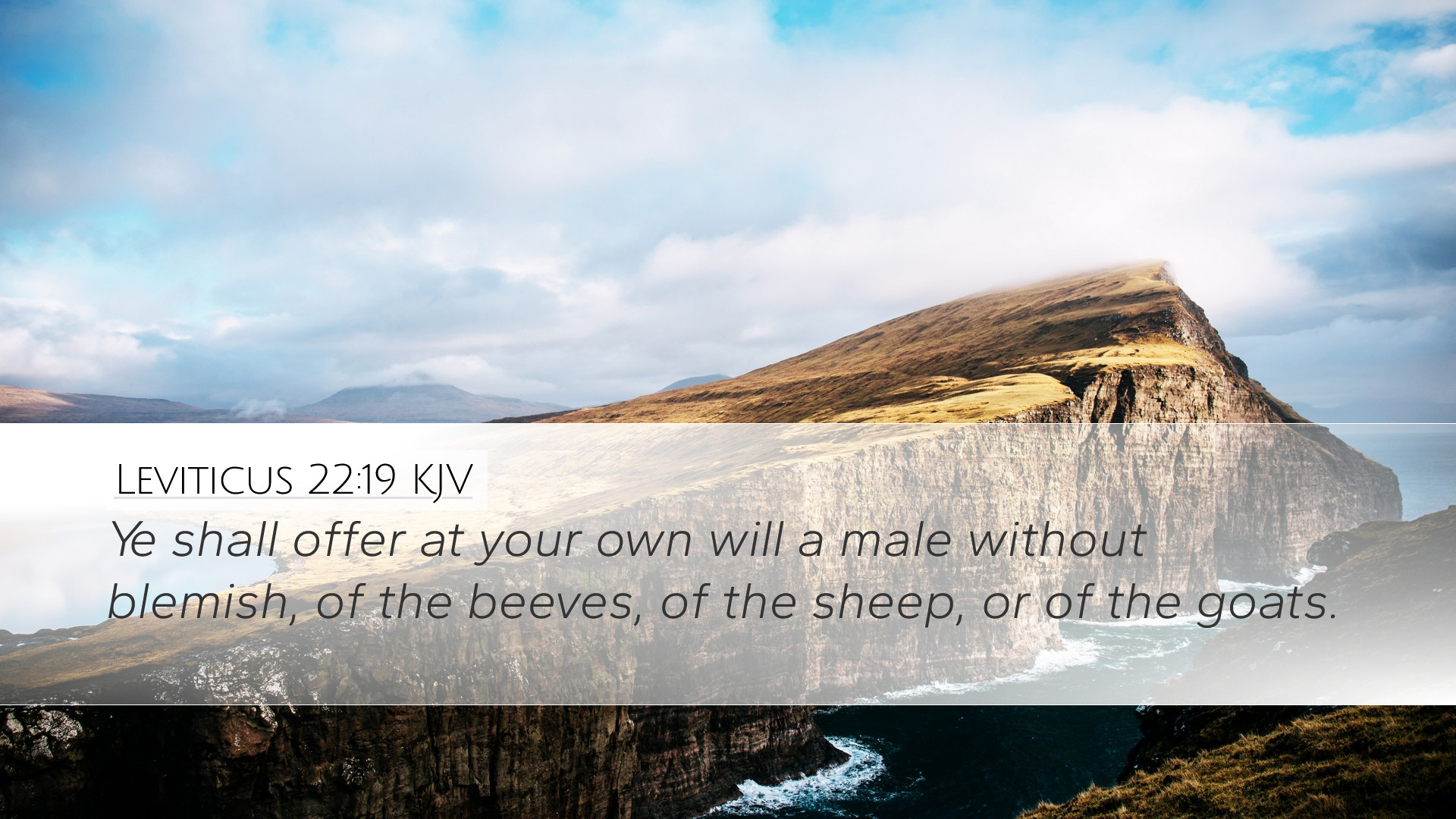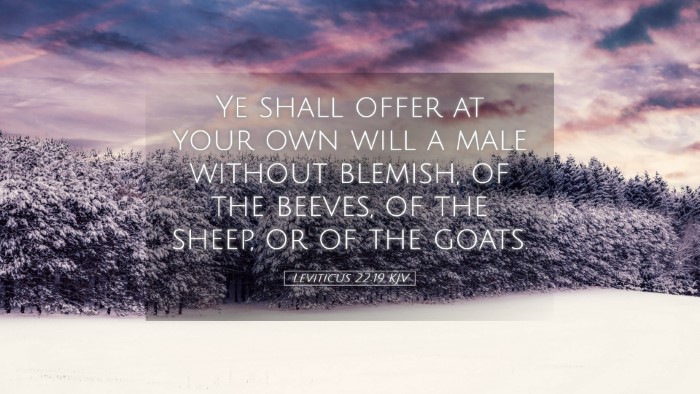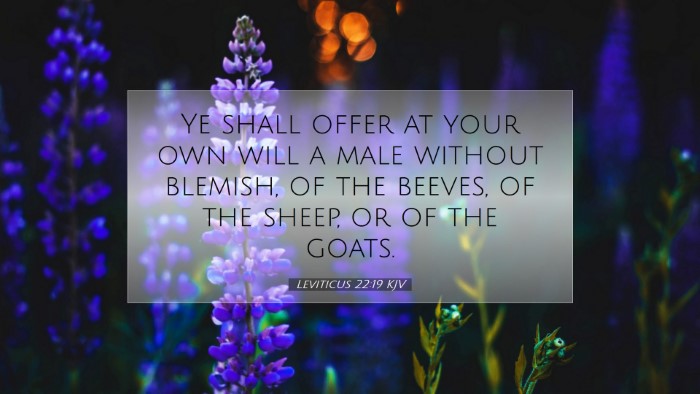Commentary on Leviticus 22:19
Verse Context: Leviticus 22:19 states, "You shall offer of your own free will a male without blemish, from the cattle, from the sheep, or from the goats." This verse is part of a larger instruction on the offerings and sacrifices within the priestly rules set forth in the book of Leviticus, which outlines the holiness required in the sacrificial system established for the people of Israel.
Historical Background
The book of Leviticus serves as a manual of holiness and religious law for the Israelite community. After the Israelites' exodus from Egypt, they were instructed on how to live as a holy nation distinct from the neighboring pagan cultures. The regulations surrounding sacrifices, particularly in this chapter, underscore the importance of purity and intentionality in worship.
Commentary Insights
The following insights synthesize the thoughts from recognized Biblical commentators:
Matthew Henry's Commentary
Matthew Henry emphasizes the principle of free will offerings in this passage. He notes that God does not compel His people to offer sacrifices; rather, He requires offerings that stem from the desire of the heart. True worship stems from a willing spirit rather than from obligation. This aligns with the broader theological theme of God desiring a sincere relationship with His people.
- Male Without Blemish: Henry points out that the requirement for a male without blemish symbolizes the perfection and purity that is necessary when approaching God. This prefigures the ultimate sacrifice of Christ, who is the Lamb of God without sin.
- From Cattle, Sheep, or Goats: Different types of animals not only point to the diversity of God's creation but also address the Israelites' various circumstances and resources. Regardless of the type of offering, the requirement remains that it be unblemished.
Albert Barnes' Notes
Albert Barnes highlights the significance of intentionality behind the offerings. He complements Henry's thoughts by stating that these regulations reflect God's desire for His worshipers to give their best and to approach Him with utmost reverence. Barnes states that the choice to offer a sacrifice must come from a spirit of devotion and gratitude.
- Free Will Offering: Barnes discusses the difference between obligatory sacrifices (such as sin offerings) and free will offerings. He asserts that the latter exemplifies a believer's love and devotion to God, showcasing an understanding of God's grace and mercy.
- Cultural Relevance: He aligns this verse with the broader context of ancient Near Eastern practices, where sacrificial offerings were integral to worship, thereby reiterating that Israel's sacrificial system was both unique and crucial to its covenant relationship with God.
Adam Clarke's Commentary
Adam Clarke provides an extensive analysis of the ritualistic aspects of the sacrificial system, addressing the symbolism involved in offering unblemished sacrifices. Clarke asserts that such animals represent the moral purity that God expects from His people.
- Symbolism of Sacrifices: Clarke explains that sacrificing an unblemished animal reflects the people’s acknowledgment of sin and their heartfelt repentance. He suggests that the act of offering something valuable signifies a willing dedication to God and an understanding of His holiness.
- Implications for Worship: Clarke connects these practices to New Testament teachings, demonstrating how they foreshadow Christ’s ultimate sacrifice on the cross. He writes about how believers today are called to present themselves as living sacrifices (Romans 12:1), embodying the principles of holiness and devotion found in this verse.
Theological Implications
Leviticus 22:19 reveals crucial theological themes relevant to modern-day believers:
- Holiness of God: The requirement for unblemished sacrifices illustrates God’s holiness and the proper standard for worship. Believers today are called to approach God with reverence, recognizing His purity.
- Nature of Worship: The emphasis on voluntary offerings emphasizes that true worship should be a heartfelt response to God's grace rather than a mere obligatory duty. Worship should reflect genuine love and adoration.
- Foreshadowing Christ: The sacrifice system elaborated in Leviticus ultimately points forward to Christ's sacrifice. Just as these animals were required to be without blemish, so was Christ—whose perfect life serves as the ultimate atonement for sin.
Practical Applications
For pastors, students, and theologians, several practical applications arise from Leviticus 22:19:
- Encouragement for Genuine Worship: Cultivate an environment in which worship stems from the heart, encouraging congregants to offer their best to God in service and commitment.
- Understanding of Old Testament Sacrifices: A deeper study of the sacrificial system can enrich preaching on New Testament themes, helping congregations appreciate the significance of Christ’s sacrifice.
- Call to Holiness: This verse serves as a reminder to pursue holiness in daily life. Just as physical offerings were to be without blemish, believers are called to live in ways that reflect Christ’s righteousness.
Conclusion
Leviticus 22:19 encapsulates essential themes of worship, holiness, and the heart's intent in offering to God. By synthesizing insights from renowned commentaries, we gain a fuller understanding that deepens both theological knowledge and practical application in the life of faith. May these reflections inspire a renewed commitment to worship that is both heartfelt and holy.


